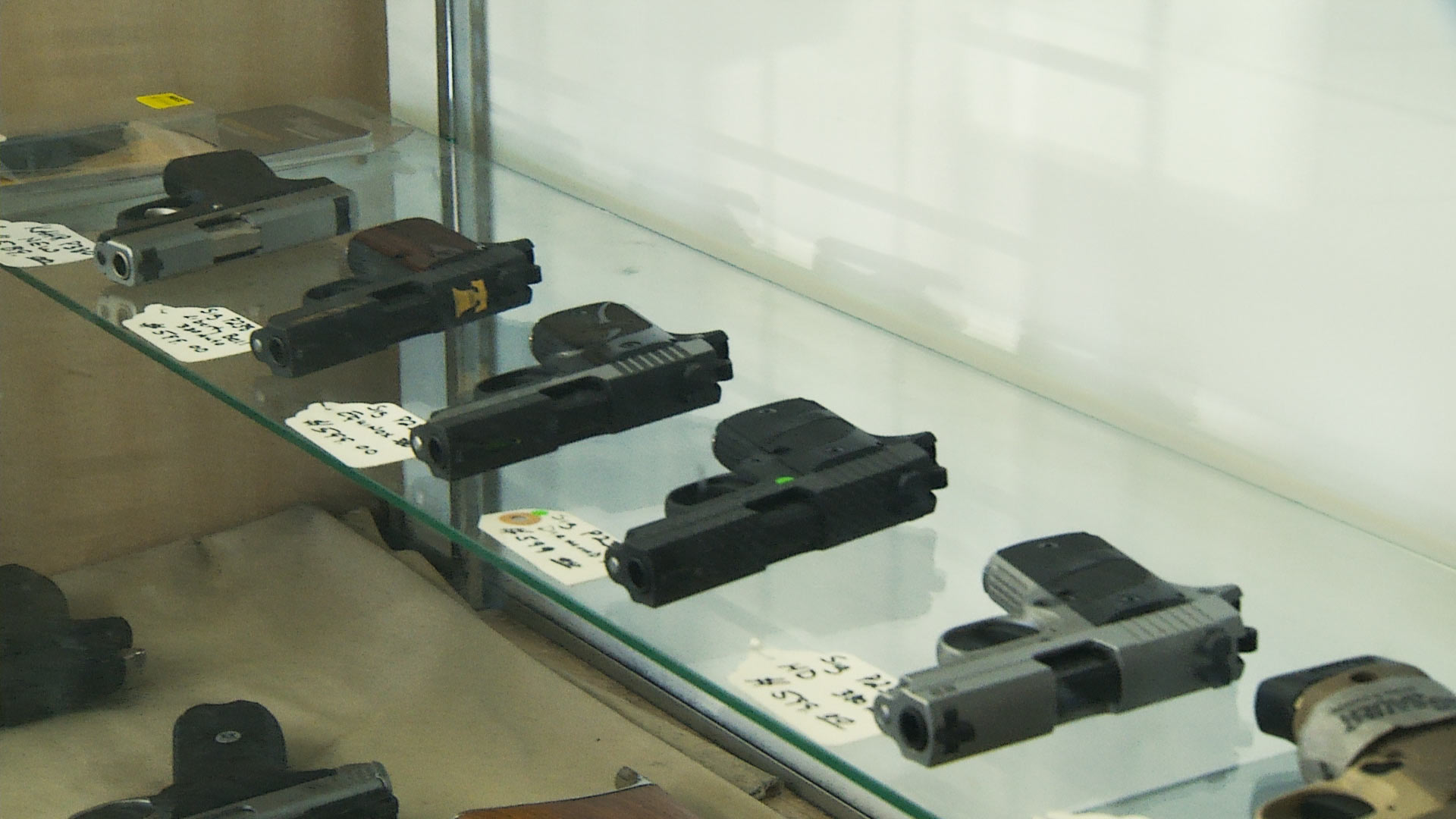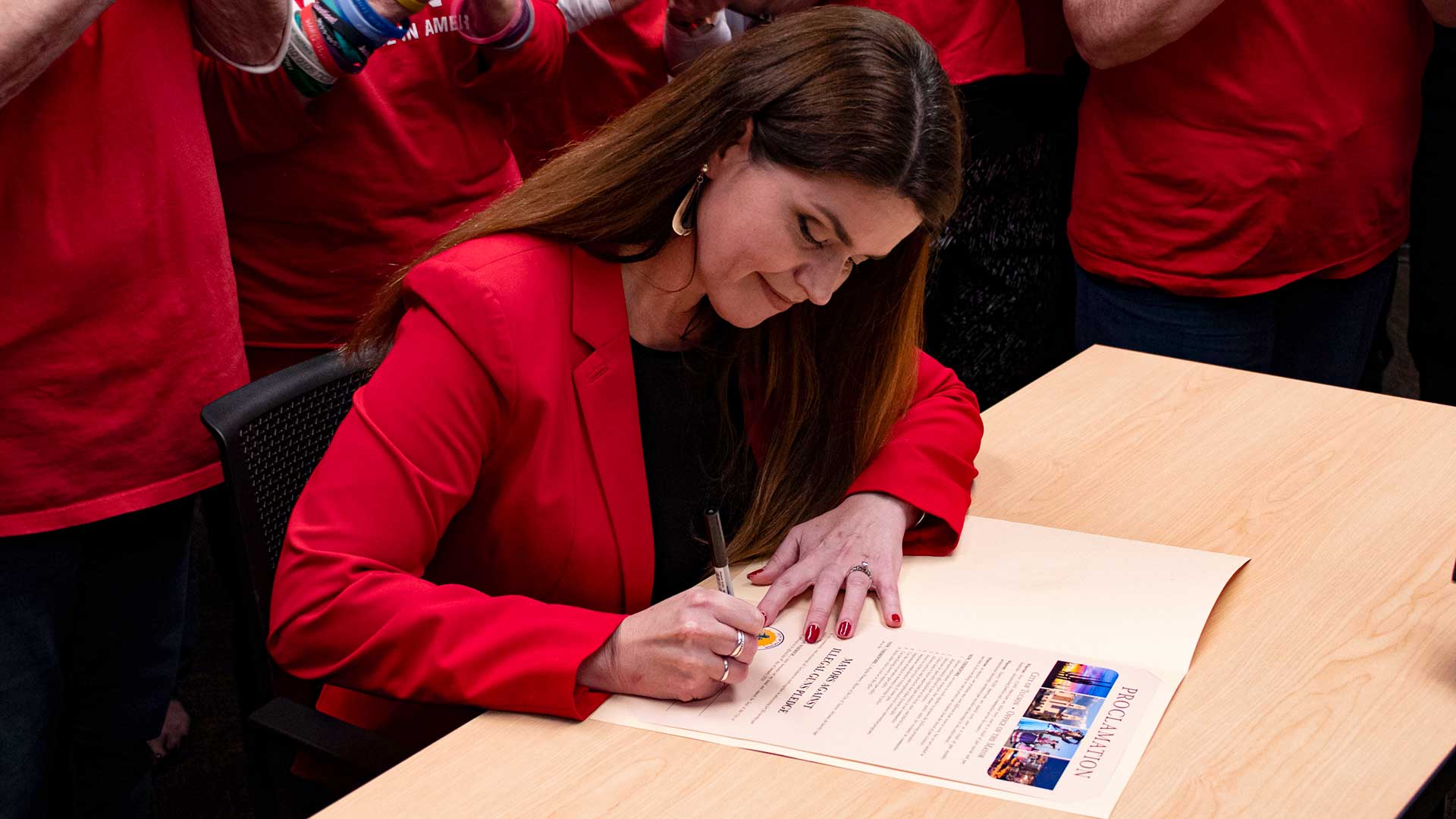 Guns on display in a Tucson store.
Guns on display in a Tucson store.
Tucson’s homicide rate rose 63% compared to the last two years to date. So far in 2021, statistics from the Tucson Police Department show that 49 people have been homicide victims. At this point in 2020 and 2019, that number was 30. Police officials say 70% of homicides are the result of gun violence.
“It’s hard to wrap our hands around this because it comes down to its simply not even road rage, its parking lot rage," said Tucson Assistant Police Chief Kevin Hall. "We’ve had incidents where people are fighting over a parking spot in a Circle K and there is a shooting and people die."
TPD has also seen an increase in robberies tied to homicides, according to Hall.
“You know they have this phone app, Offer Up. People will buy, sell, trade on Offer Up, they will meet in some pretty risky places at different times of night, and they get robbed. And if they fight back, they get shot,” Hall said.
The surge in gun violence can be seen across the country.
Hall said an increase in gun purchases in the U.S. may be part of the issue and Arizona’s gun laws aren’t helping.
“You can buy and sell guns here with no background checks. When I first moved here you could buy and sell guns at yard sales, and you still see that occasionally. That is not the norm across the nation, particularly on the East Coast,” said Hall.
Hall did make it clear that he believes that the vast majority of gun owners are responsible.
The lack of background checks on guns that are sold privately is seen as a part of the problem.
“So, because they are so easily purchased and transferred in Arizona it’s not always easy to trace them back. ATF is an excellent partner and they’ve done a really good job of helping us trace back to the original purchaser who either bought through a gun store or some other legitimate enterprise but then the gun gets traded or bought and sold and there is no way to trace that in Arizona,” Hall explained.
It was that type of legal gun sale that allows a weapon to get lost in the system, investigators believe, that allowed Leslie Scarlett to get a gun. Scarlett is the man shot and killed by a Tucson police officer after he went on a July 18th shooting spree that left three others dead and two wounded. Scarlett was not allowed to own a gun because he was a convicted felon.
Investigators with ATF said they were able to trace the gun back to its original owner who eventually sold it to another individual. After that, they have no idea where the weapon went or how many times it was sold until Scarlett used it.
“And therein lies one of the problems is that we don’t know where guns are in our community, and I wish I had more answers for you, but this is where we are,” said Dan South, Chief Criminal Deputy with the Pima County Attorney’s Office.
Month-by-month data from the Federal Bureau of Investigation show about a 5% increase in 2021 in Arizona for checks to the database that federally licensed gun dealers use before making a sale. So far this year, more than 360,000 queries have been made to the database from Arizona. The FBI cautions that queries do not equal successful sales because people can be turned down. According to another FBI database, 1.9 million people have been turned down nationally since the end of 1998.
Despite the increase in gun violence, Tucson officials said the city is still a safe place to live and work. Tucson police statistics show that if the number of annual homicides is combined with the number of traffic fatalities in the city that number still does not equal the number of overdose deaths.
“Overwhelmingly these are incidents that involve people who are involved in risky behaviors. Not all of them for sure. And none of them, none of these victims deserve to be put in positions where they lost their life,” said Assistant Chief Hall.
The rise in gun violence is not only getting the notice of the police department in Tucson.
“When homicide after homicide and gun charge after gun charge comes in, we will prosecute. And our violent crime units, our homicide prosecutors are ready to tackle the most difficult cases of the day. But what we need desperately from the community is the prevention work. We can’t solve this on the back end,” said Laura Conover, Pima County Attorney. (The Pima County Attorney and reporter Christopher Conover are not related)
Police officials hear that plea from Conover and are changing the way the department thinks.
“We’re looking at violence as a public health problem, as a disease, that violence -- particularly gun violence -- is a social contagion that spreads amongst the people that are involved in it much like a disease does,” said Hall.
 Tucson Mayor Regina Romero creates a task force on gun violence Jan. 9, 2020. She also joined the Mayors Against Illegal Guns.
Tucson Mayor Regina Romero creates a task force on gun violence Jan. 9, 2020. She also joined the Mayors Against Illegal Guns.
Early in her tenure, Tucson Mayor Regina Romero joined Mayors Against Illegal Guns-Every Town for Gun Safety. She also formed a Gun Violence Prevention Task Force that includes law enforcement, mental health professionals, academics, and community leaders.
“This is as much about community safety as it is about equity. And the reason that I say that is because we see the biggest concentrations of gun violence in areas of our community that are low income, that have been historically disinvested in, that have high percentages of individuals that do not go on to higher education,” Romero said.
To help solve some of those problems, Romero wants the city to spend about $7 million in American Rescue Plan funds.
“We want to make sure we are investing in youth programming and job support. We can use ARP dollars to invest in youth employment programs, in programs that provide paid training or work experience targeted primarily at formerly incarcerated individuals, communities experiencing high levels of violence,” said Romero.
Poverty and unemployment are some of the issues being discussed by law enforcement officials across the country as they work to stem the rising tide of gun violence.
“There’s some talk about concentrated urban poverty and the unequal or disparate rates in the victims that are involved in these homicides,” said Hall.
When high-profile shootings happen, like the one on July 18, many people quickly turn to mental health as the root of the problem. But professionals say links between mental health and gun violence are not always warranted.
“There are some mental health conditions especially symptoms that can lead a person to be at higher risk of violence, however, most individuals who are struggling with mental health issues are often victims of violence and not people who engage in violent acts themselves,” said Dr. Jasleen Chhatwal, Chief Medical Officer at Sierra Tucson.
While mental health and gun violence are not always linked there are some risk factors, especially exposure to violence.
“So, if you live in a community where there is a lot of violence that you see or violence within the family can lead to a person becoming numb to that behavior and thinking that’s really the way to engage in discord or difficult situations,” Chhatwal said.
Everyone involved in the discussion aimed at ending gun violence said understanding the roots of the problem is only the beginning. Now, they must come up with actions to address the causes.

By submitting your comments, you hereby give AZPM the right to post your comments and potentially use them in any other form of media operated by this institution.